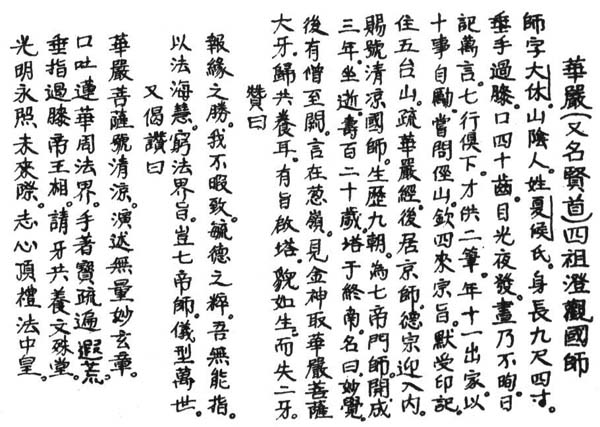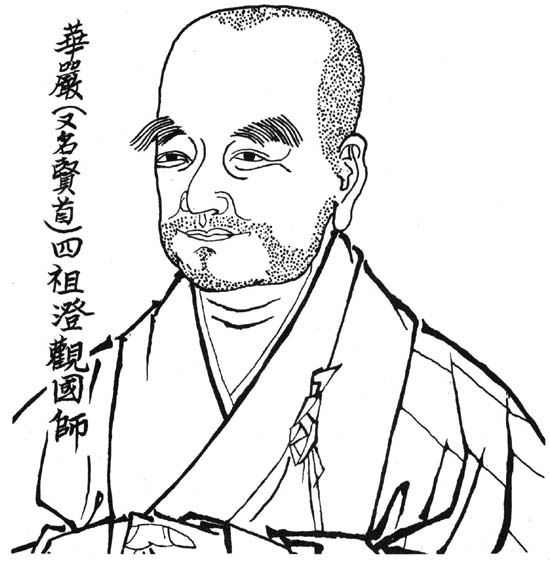|
Sixth, I will not lie on the bed of a
home-dweller.
Seventh, I will not cast my eyes upon
unprincipled spectacles.
Eighth, I will not taste the flavor of
edibles after noon.
Ninth, My hands will not set down my
recitation beads.
Tenth, I will keep my robes and bowl by
my side at night.
When
he traveled to Mt. Ching to inquire of Master Ch'in the import of the doctrine,
which had come from the West, hereceived the Mind Seal. The Master then dwelled
on Mount Wu T'ai where he composed his Commentary on the Avatamsaka Sutra.
Afterwards, while he lived in Ch'ang Shih, Emperor T'ai Tsung invited him to the
Imperial Palace and bestowed the title of National Master Ch'ing Liang upon him.
The
Master lived through nine reigns and was the Precept Master of Seven Emperors.
In the third year of the reign period K'ai Ch'ing (839 C.E.), at the age of 120,
he sat, and died.
Master
Ch'ing Liang's pagoda is at Mount Chung Nan. The Emperor gave him the posthumous
title of Miao Chiao, "Wonderful Awareness," the name by which the
pagoda is also known.
Later
on a Sanghan arrived at the imperial city and announced that while in the Onion
Mountains (the Belaturgh Range in Chinese Turkestan), he had seen a divinity
armored in gold who had come to obtain Avatamsaka Bodhisattva's teeth and then
return to India to make offerings to them. The Emperor thereupon ordered the
pagoda opened. The Master's remains appeared as if he were still alive, except
that he was missing two wisdom teeth.
The Master's eulogy says:
The Master's state was unsurpassed, I
cannot be compared to him.
Nor can I attempt to expound the
radiance of his splendid virtue.
Using the wisdom of the Dharma Sea, he
reached the limits of the Dharma realm,
Not only the Master of seven kings, he
cast a model for ten thousand ages.
Another verse in his praise says:
Avatamsaka Bodhisattva's name was Ch'ing
Liang,
He proclaimed and authored a myriad
wonderful works.
Sweet lotus blossoms sprang from his
mouth filling the Dharma realm,
And in his hand a precious commentary
reached the most distant lands.
His hands hung down beneath his
knees--the form of an august king--
His teeth were requested at Manjusri's
Hall, the object of offerings.
His brilliant light eternally shines to
the shores of distant times,
With my most determined thought I bow to
the exalted in the Law.

|

